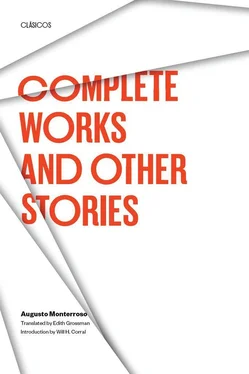“Maestro, I would like you to meet Feijoo. He is an Unamuno specialist and is preparing a critical edition of the Complete Works .”
Feijoo shook his hand and said two or three words that were almost inaudible but meant yes, pleased to meet you, while Fombona greeted someone across the room, or looked for a match, or something.
Note
1 Daysie’s, on Calle Versalles, near Reforma.
Life is not an essay, although we attempt many things; it is not a story, although we invent many things; it is not a poem, although we dream many things. The essay about the story about the poem about life is perpetual motion; that’s it exactly, perpetual motion.
I wish to change my style and my words.
LOPE DE VEGA
There are three themes: love, death, and flies. For as long as man has existed, this emotion, this fear, these presences have always been with him. Let others deal with the first two. I concern myself with flies, who are better than men, but not women. Years ago I had the idea of compiling a world anthology of the fly. I still do.1 I soon realized, however, that it was a practically infinite undertaking. The fly invades all literatures, and, of course, wherever one looks one finds the fly. No true writer passes up the opportunity to dedicate a poem, a page, a paragraph, a line, to the fly; and if you are a writer who has not yet done so, I advise you to follow my lead and begin immediately; flies are the Eumenides, the Furies; they punish. They are the avengers of something, we don’t know what, but you know they have pursued you on occasion and, as far as you can tell, will go on pursuing you forever. They watch. They are the vicars of an unnameable being that is exceedingly good, or else malevolent. They hound you. They follow you. They observe you. In the end, when you die, it is both probable and sad that a fly will suffice to carry your poor distraught soul off to somewhere. Having inherited the task ad infinitum, flies transport the souls of our dead, our ancestors, who in this way can remain close to us, be with us, protect us. Our tiny souls transmigrate through flies, and flies accumulate wisdom and know everything we dare not know. Perhaps the final transmitter of our ungainly Western culture will be the body of this fly, reproduced but not enriched over the centuries. As I believe Milla said (an author about whom you know nothing, naturally, but because he was concerned with the fly, you hear his name mentioned for the first time today), the fly, if viewed correctly, is not as ugly as it appears at first sight. But, in fact, it does not seem ugly at first sight precisely because no one has ever seen a fly at first sight. Every fly has always been seen. There is some doubt as to which came first, the chicken or the egg. It has never occurred to anybody to wonder whether the fly came before or after. In the beginning was the fly. (It was almost inevitable that in the beginning was the fly or some phrase like it would appear here. We live by sentences like these. Fly-sentences, which like fly-sorrows, mean nothing. The pursuing sentences that fill our books.) Forget about that. It is easier for a fly to land on the nose of the Pope than for the Pope to land on the nose of a fly. The Pope, or the King, or the President (the President of the Republic, naturally; the president of a financial or commercial firm, or of the company that manufactures product-x, is generally foolish enough to consider himself superior to flies) are incapable of calling out their Swiss guards or royal guards or presidential guards to exterminate a fly. On the contrary, they are tolerant; at the most, they might scratch their noses. They know. And they know that the fly also knows and watches them; they know that what we really have are guardian flies who constantly keep us from falling into great, authentic sins, the kind that require true guardian angels who may suddenly grow careless and become accomplices, like Hitler’s guardian angel, or Johnson’s. But never mind. Back to noses. The fly that perched on your nose today is a direct descendant of the one that landed on Cleopatra’s. And once again you fall into the ready-made rhetorical allusions that everybody has used before. You make literature in spite of yourself. The fly wants you to envelop him in an atmosphere of kings, popes, and emperors. And he succeeds. He controls you. You cannot speak of the fly without feeling disposed to grandeur. Oh, Melville, you had to sail the seas before you could finally set that great white whale on your desk in Pittsfield, Massachusetts, not realizing that Evil had long ago circled your strawberry ice cream on the warm afternoons of your childhood; and, with the passage of the years, flew over your head at twilight when you tore occasional hairs from your golden beard as you read Cervantes and polished your style; and did not necessarily inhabit that misshapen vastness of bone and sperm incapable of harming anyone unless that person interrupted his siesta, like mad Ahab. And Poe and his raven? Ridiculous. Just look at the fly. Observe. Think.
Note
1 Throughout this book you will see a small, absolutely inadequate sample of the anthology.
Linnaeus might have said that three flies can consume a cadaver as quickly as a lion.
HENRI BARBUSE, HELL
Pape: Satan, pape: Satan Aleppe
DANTE, INFERNO, VII
“Did you remember?”
Luis became involved in a complicated but basically weak mental effort to remember what it was he was supposed to have remembered.
“No.”
Juan’s gesture of disgust indicated that this time it must have been something really important and his having forgotten would bring the usual negative consequences. It was always the same. The whole night thinking I mustn’t forget only to forget at the last minute. As if he did it on purpose. If they only knew the effort it cost him trying to remember, let alone remembering itself. Just like elementary school: 9 × 7?
“What happened?”
“What do you mean what happened?”
“Just what I said. How could you forget?”
He didn’t know what to say. An attempt at counterattack:
“Nothing happened. I just forgot.”
“I just forgot! And now?”
“And now?”
Resigned and conciliatory, Juan ordered, or according to Luis afterward, perhaps he simply said that they wouldn’t discuss it anymore and did he want a drink.
Yes. He helped himself. Whiskey and water. He put in three ice cubes that began to melt rapidly in the heat, although not enough to make him decide to put in another one. It had a soothing amber color. Why soothing? Not of course because of the color but because it was whiskey, whiskey with water that would make him forget he had to remember something.
“Cheers.”
“Cheers.”
“What a life,” said Luis ironically, shifting in the wooden chair and looking calmly at the beach, the ocean, the boats, the horizon — the horizon that was even better than the boats and the ocean and the beach because out there you didn’t have to think or imagine or remember anything anymore.
On the oblivious sand several bathers were running in the last light of dusk with their soft hair and their bodies darker than tan after several days of daring exposure to the severity of the sky king. Juan watched them thoughtfully. He was thinking, palely, that Acapulco was no longer the same, perhaps he was no longer the same either, only his wife was the same, and the one certainty was that right now she was embracing another man behind some rocks or in some bar or on some boat. He didn’t really care, but that didn’t mean he didn’t think about it all the time. The two things had nothing to do with one another. Julia would go on being Julia forever, just as he had first seen her six years ago when, without provocation and with some surprise on his part, she stared at him at a party where he hardly knew anyone and came up to him and asked him to dance and he said yes and she put her arms around him and began to excite him rubbing up against him and searching for him with her legs and moving against him gently but with calculation so he would feel the brush of her breasts and stop being nervous and not be afraid.
Читать дальше











